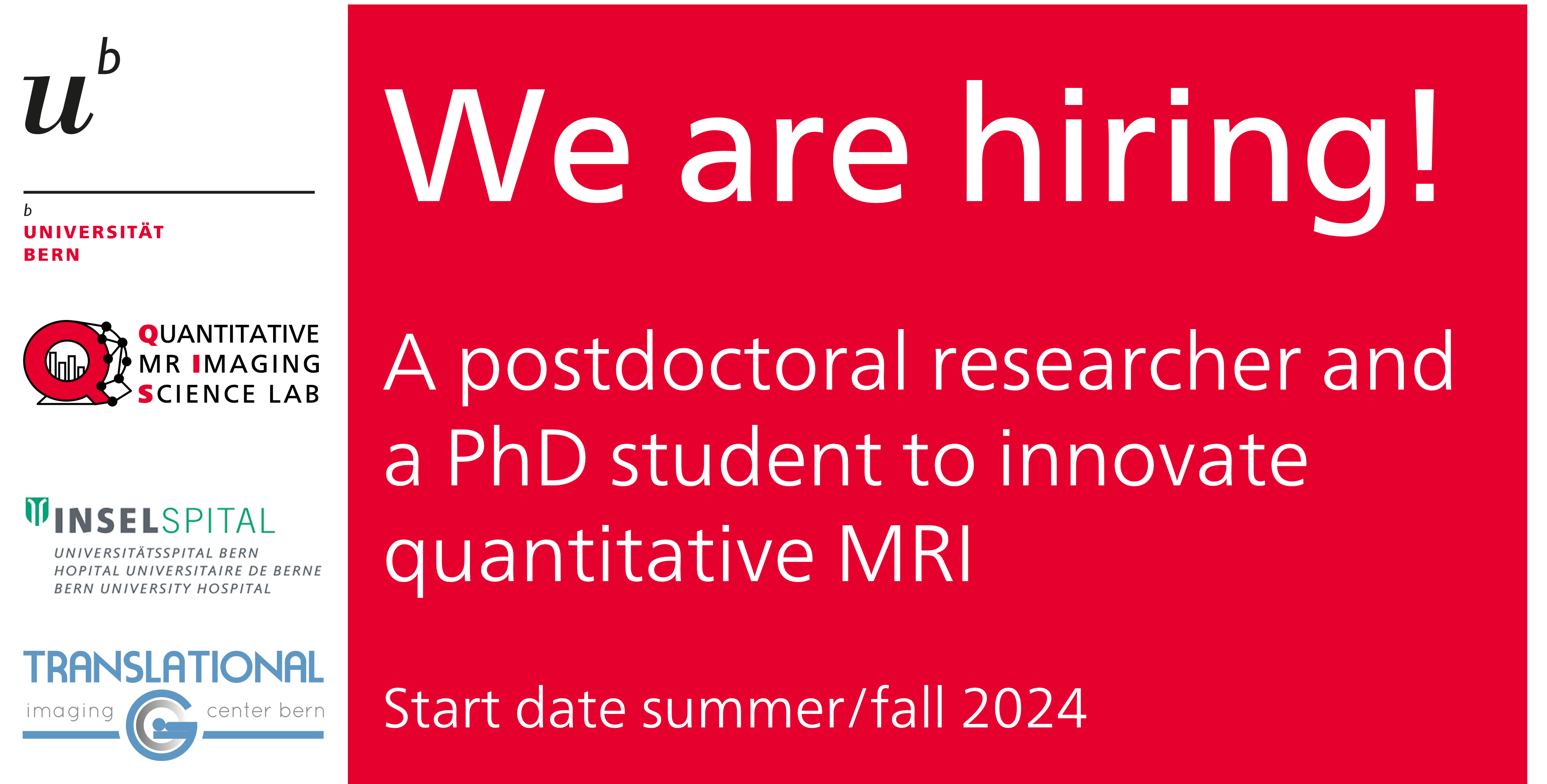We are looking for two motivated researchers who are interested in working at the intersection of engineering, physics, and medicine. The candidates will join a growing and dynamic team to push MRI further! The advertised positions are funded by the Swiss National Science Foundation.
Start date: Summer/fall 2024 in Bern, Switzerland
Application deadline: May 31st, 2024
Project background
The project aims to bring an innovative perspective on quantitative imaging to address unmet clinical needs, especially for staging liver disease, which affects 25-30% of the global adult population. Existing MRI technology faces challenges due to the increasing presence of hepatic lipids, magnetic susceptibility close to liver-lung interfaces, and breathing motion.
The project aims to remove these confounders to capture a complete and accurate picture of organ health. The project builds on our recent theoretical developments to extract biomarker information from signal asymmetries embedded within MRI data. The challenge is to disentangle or avoid the presence of confounding signal sources in large organ volumes, and the multi-dimensional nature of the MRI data, which requires a rethink of data acquisition and reconstruction approaches. Unbiased quantitative biomarker maps will be obtained by further developing novel RF excitation schemes, tailored data sub-sampling strategies, and model-based reconstructions. Our recent results demonstrated the capability to extract susceptibility maps and diffusion metrics from the same data, which will also be explored. The project includes the translation of the technology to different organs. Finally, project partners at the University Hospital of Bern & Lausanne will evaluate its clinical potential. The methodology will be integrated in ongoing trials, which target biomarkers for fibrosis, iron, fat, inflammation, cirrhosis, and hepatocellular carcinoma.
Both candidates will work under the supervision of Prof. Jessica Bastiaansen and will be involved in all aspects of the project, with each having a specific and independent focus. These will be adjusted based on the background and interests of the applicants. The candidates are expected to author papers and present the results at international scientific conferences.
Funding is available for up to 4 years, through a yearly renewable contract in compliance with guidelines of the University of Bern.
Research environment
You will be integrated with a team that is part of the Department of Radiology at the University Hospital Bern (Inselspital) and the University of Bern. The research group has access to state-of-the-art MRI systems (1.5T, 3T, 7T) located in the hospital and in the Translational Imaging Center. We have access to wet labs, a variety of standardized MRI phantoms, and ample GPU computing. You will join an exciting initiative in active collaboration with Siemens Healthineers (on-site scientists), clinicians from different departments, and the Translational Imaging Center (TIC) at the SITEM-INSEL. The SITEM-INSEL hosts various research groups and start-ups thereby fostering entrepreneurship. Through collaborations with the AI center (CAIM) and the ARTORG Center for Biomedical Engineering, the environment contributes to thriving (bio)medical research activities. The prospective PhD student will enroll in the Graduate School of Biomedical Engineering at the University of Bern.
Required qualifications
We are looking for colleagues with a curious and critical mindset to help us take MRI to the next level. We adhere to the principles of open research as defined by the SNSF. Further requirements:
Applicants for the PhD position:
- You have an MSc degree in electrical engineering, biomedical engineering, computational sciences, physics, mathematics, or a related field. Familiarity with MRI physics would be a plus.
- You are at ease with optimization mathematics, signal processing, and image reconstruction.
- Prior experience with programming and image processing is an advantage.
- Strong team spirit and ability to work autonomously with a willingness to learn.
Applicants for the Postdoctoral position:
- You have a PhD degree in engineering, physics, or a related field with a publication record in imaging research, preferably MRI.
- You are familiar with modern image reconstruction techniques (iterative image reconstruction, compressed sensing, etc.) and signal processing (non-linear optimization algorithms, signal modeling, and fitting).
- Experience with sequence development and abdominal imaging would be a plus.
- You have an interest in supervising research projects and guiding undergraduate students.
What we offer
- Stimulating international work environment.
- A conveniently located workplace in the heart of Bern, well-served by public transportation.
- Professional development opportunities: The University of Bern provides internal training and coaching to enhance your abilities continuously.
- Work-life balance: Benefit from flexible schedules, along with options for remote, hybrid, or part-time work arrangements (subject to agreement).
- Competitive social benefits and structured salary growth aligned with job duties.
- Enjoy 25 days of annual leave in addition to public holidays.
- The postdoctoral researcher is expected to dedicate 20% of their time to own research, and to develop an academic career (grant applications, supervision).
How to apply
Please send the following by email to Prof. Jessica Bastiaansen (jessica.bastiaansen@unibe.ch).
- A motivation letter describing your research interests.
- A detailed CV.
- Your MSc thesis or PhD thesis (if available).
- Names and contact information of at least 2 references.
Screening of applications starts in June 2024 and will continue until the position is filled. The start of the project is foreseen by the end of summer 2024 or in agreement.
If you would like to know more, additional information about the research group can be found on our website. Questions regarding the positions can be directed to Prof. Jessica Bastiaansen.

